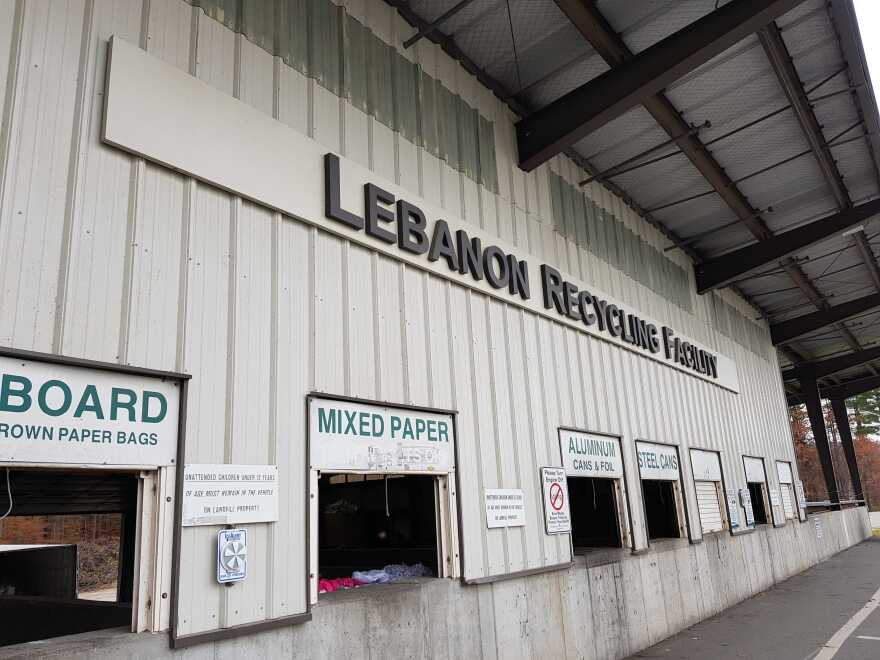Earlier this year, the city of Lebanon gave a small group of residents the chance to bring not their trash and recyclables to the local landfill, but their compost too.
It makes Lebanon one of a few cities in the state helping residents reduce food waste, which is a major contributor to climate change.
Want to get NHPR's climate stories in your inbox? Sign up for our newsletter today.
For a few weeks in late winter and early spring, Brooke D’Entremont would pull out her scale before heading to the landfill. With her daughter’s help, they’d weigh their trash, recyclables and their compost.
Then they’d write that all down on a form they’d received from the Lebanon landfill to keep track of their waste production. It was a key part of the compost pilot program D’Entremont signed up for back in January.

The program is focused not just on reducing waste, but on keeping track of how much they’re composting and how their habits changed.
“I think like a lot of people I'm concerned about the state of the environment and I'm trying to be sustainable,” D’Entremont said.
D’Entremont had tried composting before: both in her backyard and using a curbside pick up service. But animals messed up the backyard composting, and curbside pick up got expensive.
This new program though is a lot easier for D’Entremont. She puts her food scraps in a compostable bag, keeps that in a 5 gallon bucket, and drops it off in a bin at the landfill.
That makes Lebanon just one of three municipalities that do their own composting in New Hampshire. Other municipalities, like Portsmouth, accept compost, but use a private company to process it.
For Marc Morgan, Lebanon’s solid waste manager, the less waste there is in his landfill the better.
According to an EPA study, about 15 to 20 percent of the waste stream is food scraps: moldy food, fruit peels, bones.
“That’s unbelievable. That’s a lot,” said Morgan. “We recycle all sorts of things that are much less of the waste stream.
There are a few reasons Morgan wants to divert food scraps from the Lebanon landfill. One is that space is increasingly limited in New Hampshire’s landfills, and when food scraps do go into landfills, “the decomposition of food waste contributes to greenhouse gases.”
Which, in turn, contributes to keeping heat trapped in our atmosphere and changing our climate.
Here’s how that happens: when food scraps are in a landfill, they’re in an oxygen deprived environment, slowing down the decomposition process and producing methane gas, a greenhouse gas.

Landfills, according to the Environmental Protection Agency, are the third largest source of methane emissions in the country.
Morgan wanted to quantify how much food waste was going into his landfill, which serves 21 towns in the Upper Valley.
“The thought was if we do a pilot, we can get a better sense for what homeowners are generating,” Morgan said. Lebanon already accepts food scraps from businesses, but Morgan says, residents have been asking for a program like this for a long time.
About thirty households started in the pilot program. Several dropped off during the pandemic. Five months later, 11 households, including the D’Entremont’s, had kept track of all their waste data: food scraps, trash and recycling.
As of mid-July, the pilot program had diverted more than 1,800 pounds of food scraps from the landfill, "which is crazy," Morgan said.
In other words, 11 households in the Upper Valley created nearly one ton of food scraps in five months.
NHPR is doubling down on covering climate change. Support this work -- make a donation today.
That much food waste in a landfill would create comparable emissions to driving about 1,200 miles by car, according to an Environmental Protection Agency calculator. That’s a drive from the Upper Valley to Florida.
And if it doesn't seem like much, remember it came from just a handful of households in less than half a year. Scaled up, more composting could have a real impact.

In launching this project, Morgan was hoping that if people quantified how much trash they produced, that might lead them to make other changes in their lives... and he heard that from some participants.
“This individual household bought more bulk, froze things, froze and prepared more meals. It had a noticeable impact on their food scraps,” Morgan said.
Laura Gillespie of Lebanon also participated in the pilot program. She’s an avid cook; she even has a binder organized by recipe type: pasta, meat, fish, carbs.
She wanted a place to compost her cheese rinds, chicken carcasses and vegetable scraps. Gillespie had tried backyard composting, but animals got into it.
Gillespie says she does her best to make environmentally conscious decisions -- flying less, recycling more, but doing the research and making those choices can weigh on her.
“Doing better with our modern life can feel overwhelming,” she said.
So for her, the fact that Lebanon had created a system made it easier for her to stick with composting once she started.
“As attitudes change, and systems make it easier for us to participate and think about recycling or composting, it gets easier,” Gillespie said. “If you have the right tools and the right bins and the right bags.”
While Lebanon has had success in this pilot program, and Morgan plans making composting more widely available to landfill users in the next month, widespread infrastructure for composting in New Hampshire is limited.
That’s because some of the rules around composting in New Hampshire are complicated. There’s a special, more in-depth application process to compost meat and dairy that can discourage municipalities and independent companies from starting composting programs.

Michael Nork works at the solid waste management bureau of the state Department of Environmental Services. He says composting is actually one of the state’s preferred strategies for managing waste, after recycling and making less waste in the first place.
“The long and short of it is we don’t want to be an impediment in composting, we want to see more development and other types of recycling as well,” he said.
Currently, DES is working with people interested in composting to also apply for a waiver for current restrictions on composting meat and diary.
“We’re finding other pathways to accommodate people’s goals,” he said.
Nork says he’s hopeful there will be new rules by next year that would make composting easier by eliminating the meat and dairy restrictions.
The bill that would initiate that rule re-write is just waiting for the governor’s signature.









